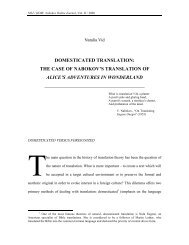Nabokov's Invitation to Plato's Beheading
Nabokov's Invitation to Plato's Beheading
Nabokov's Invitation to Plato's Beheading
- TAGS
- beheading
- etc.dal.ca
You also want an ePaper? Increase the reach of your titles
YUMPU automatically turns print PDFs into web optimized ePapers that Google loves.
NOJ / НОЖ: Nabokov Online Journal, Vol. I / 2007<br />
“beings akin <strong>to</strong> him” (223). The parallels between these passages, which suggests<br />
Nabokov’s conscious use of Pla<strong>to</strong>nic imagery, makes even more sense when we recall<br />
that John Shade, the great poet of Nabokov’s Pale Fire, imagined his afterlife in terms of<br />
“the talks / With Socrates and Proust in cypress walks” (41).<br />
In spite of the apparent optimism about afterlife which pervades Pla<strong>to</strong>’s works,<br />
one can nonetheless perceive an undeniable lack of certainty in his discussion of death.<br />
Although Socrates often appears <strong>to</strong> be assured of his chances of surviving his execution,<br />
at other times his optimism in immortality is countered with unsettling thoughts which<br />
many readers of his works tend <strong>to</strong> ignore. What if the afterlife is just a dream, a<br />
comforting way <strong>to</strong> cope with death? For Socrates (and, as we will see later, for<br />
Cincinnatus as well) the prospect of surviving his deaths is not assured at all. He has<br />
many doubts that his discussion about afterlife appears <strong>to</strong> be notably speculative. For<br />
example, his hope for encountering Homer in afterlife starts <strong>to</strong> dissipate when he adds:<br />
“I’d be willing <strong>to</strong> die many times, if it were truth” (Apology 41a, my emphasis), “[If] it<br />
were true,” he continues this thought on another occasion, “there is good hope that on<br />
arriving where I am going, if anywhere, I shall acquire what has been our chief<br />
preoccupation in our past life, so that the journey that is now ordered for me is full of<br />
good hope, as it is also for any other man who believes that his mind has been prepared<br />
and, as it were, purified” (Phaedo 67b-c, my emphasis). Pla<strong>to</strong> makes it unavoidably clear<br />
that Socrates’ view of immortality relies not so much on indisputable knowledge but on<br />
“good hope” and belief, which are not always convincing, even <strong>to</strong> Socrates.<br />
On several occasions Pla<strong>to</strong> actually gives the impression that Socrates constructs<br />
his theory of immortality merely as a way <strong>to</strong> give a special meaning <strong>to</strong> his impeding
















